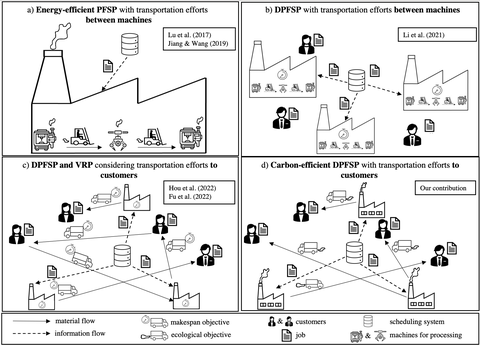14.06.2022
Neue Veröffentlichung des Lehrstuhls in Journal of Cleaner Production

Integration von Transporten in der Maschinenbelegungsplanung von verteilten Produktionssystemen
Wir freuen uns über die Veröffentlichung des Artikels "Multi-objective carbon-efficient scheduling in distributed permutation flow shops under consideration of transportation efforts" in Journal of Cleaner Production, welche aus der Zusammenarbeit unserer Mitarbeiter von Sven Schulz und und Janis Neufeld mit Martin Schönheit (Professur für Logistik) entstanden ist.
Abstract
The reduction of carbon emissions plays a crucial role in achieving the goals of cleaner production. Thereby, the total amount of emissions depends not only on the used production technologies but on the electricity mix and the transportation of products to customers. Nevertheless, despite significant differences of these factors based on the location of respective manufacturing facilities, they have not been considered explicitly in distributed manufacturing until now. Therefore, we study a multi-objective distributed permutation flowshop scheduling problem to equally minimize makespan and carbon emission caused by both production and transportation. This creates the challenge of strategically assigning jobs to factories, sequencing jobs in a factory, and selecting the production speed. Firstly, a mixed-integer programming model is presented. With the help of the adaptive bisection -constraint method, small instances are solved optimally, enabling an analysis of the problem characteristics. Furthermore, a novel multi-objective iterated greedy algorithm is proposed to solve realistic instances. A comparison with the established Non-dominated Sorting Genetic Algorithm 2 proves its efficiency and suitability for solving the problem at hand. Finally, a case study provides detailed insights on the impact of certain influencing factors such as product weights, production-related energy consumption, and the heterogeneity of the production facilities in the network. The results emphasize the importance of appropriate scheduling approaches to obtain economic and ecological efficiency in production networks.
